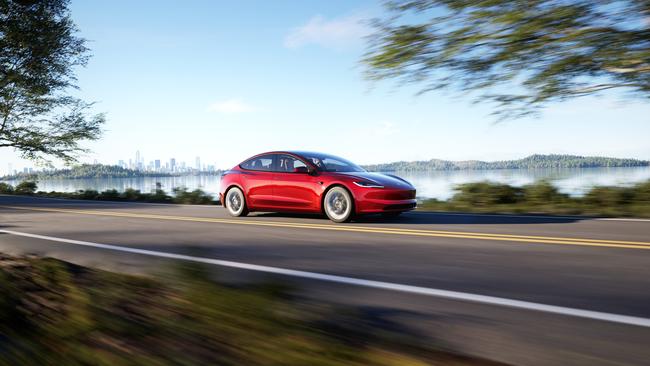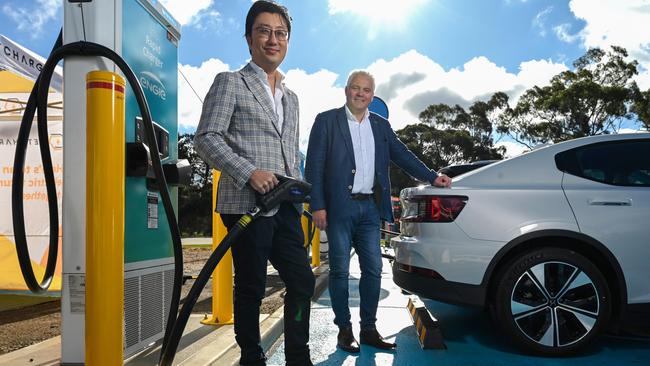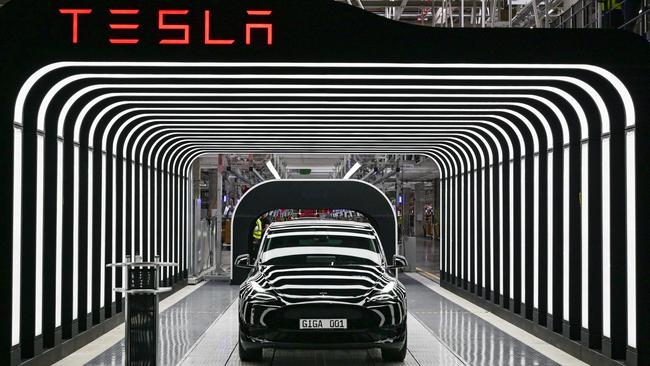David Penberthy: EV owners should pay a road-user charge to keep things equal for motorists
Electric vehicles are exploding in popularity but there’s a massive gulf emerging in equality on our roads as a result. David Penberthy explains.
Opinion
Don't miss out on the headlines from Opinion. Followed categories will be added to My News.
In the midst of a cost of living crisis, with petrol prices already high and tipped to go higher due to the crisis in the Middle East, the average punter has just had another setback in terms of making ends meet.
It came in the form of last Wednesday’s High Court ruling declaring the Victorian Government’s road user charge on electric vehicles was unconstitutional, as it was in effect a tax which only the Commonwealth had the legal authority to impose.
The decision is a big one which has ramifications for every state which has introduced or flagged its intention to charge electric vehicle owners for using the roads.
In human terms, it means that richer people who can afford electric cars are currently free from contributing towards the upkeep of our road system, and everyone else has to pay as a result of using vehicles that rely on petrol.

Dan Andrews attracted plenty of criticism over his tenure for his love of taxation, but at the risk of breaking the habit of a lifetime, I would defend the former premier for trying to strike a fair balance with his now-defunct proposal.
Under the plan, motorists with electric vehicles would have been charged at a rate of two cents per kilometre travelled with drivers required to submit a photograph of their odometer once a year. Failure to submit a photograph would result in the driver being charged for travelling a default distance of 13,500km, or having their registration cancelled or suspended.
The tax was expected to raise about $30 million each year and prompted other states to follow suit. The former Liberal Government in South Australia had flagged a similar scheme involving a standard registration-style fee and a separate usage-based component involving a log book. The new Labor Government in SA opposed the move saying it was an attack on the environment and would discourage the uptake of electric vehicles.
As a result of the High Court’s decision, where are we left now?
We are left with a situation where everyone who doesn’t have an electric vehicle will be solely responsible for the upkeep of our road system.
By “responsible”, read responsible to the tune of an eye-watering $49 billion tax a year in the form of fuel excise.
Environmentalists have no issue with this because they regard petrol-fuelled cars as the work of the devil. At a time of such financial stress, it is still worth asking the question whether it is fair that the average punter has to do all of the heavy lifting when it comes to keeping the road system operational, especially when many EVs are heavier on the road than comparable family cars due to the weight of their batteries.
Advocates of EVs say the price is falling fast and that soon there will be no real cost difference between a petrol-fuelled or electricity-fuelled vehicle. We are not at that point yet. And the reality, too, is that lower income Australians can’t afford to buy a brand-new car anyway, regardless of what it’s powered by, meaning they are consigned to be stuck with the petrol-fuelled ones that attract all the tax in the form of excise.
The people who are licking their lips at all this are the people who make and sell electric vehicles. The Electric Vehicle Council issued a statement on Thursday applauding the High Court ruling.
“Any road user charge scheme should be national and we now look forward to working with the federal government on sensible road funding reform, without singling out drivers who are trying to do the right thing,” EVC chief executive Behyad Jafari said.

The reference to a road user charge also presents an economic threat to working class people in the outer suburbs and regions.
On the face of it, a road user charge applied to both petrol-fuelled and electric cars means everyone is making a contribution. But it could also make the road funding system even more skewed against low-income people on the outskirts of town.
Not only are they less able to afford an EV, they are less likely to want one anyway given the challenges recharging them away from the inner city, especially in regional and rural areas. They risk paying more than they do now through excise under a road user charge as by necessity they must drive longer distances to work and to get their kids to school and sport.
Conversely, with inner-city EV ownership at its highest in the inner suburbs, affluent people making short trips would make the lowest contribution to the maintenance of the road system.
Some of these faddish environmental policies are producing perverse outcomes in a social fairness context.

I learnt from a friend the other day that some of the power companies will give you a lower base rate if you can demonstrate that you own an electric vehicle. All you have to do is provide them with proof of registration and you get a discount.
This policy has two effects. It is a symbolic gesture by power companies that still use coal and gas, keen to finesse their reputations against claims of environmental vandalism.
And it means that someone who is rich enough to buy a Tesla saves money on their electricity bills, while the family in an outer suburb driving a 1999 Commodore gets stuff all.
Labor governments have a particular responsibility in their management of this.
It’s the type of issue which brings the ALP’s modern green credentials crashing headfirst into the party’s historic and stated commitment to fighting for the poor.
The environmental purists may love it, but I don’t see why the tax system should be structured around protecting Tesla-driving millionaires in Sydney’s Balmain so they can drive tax-free from one end of Darling St to the other to buy a loaf of organic sourdough.





